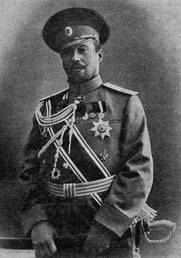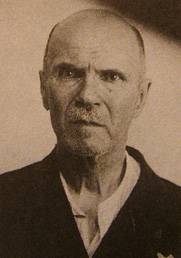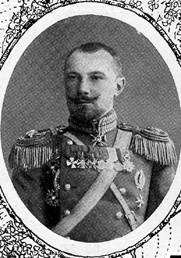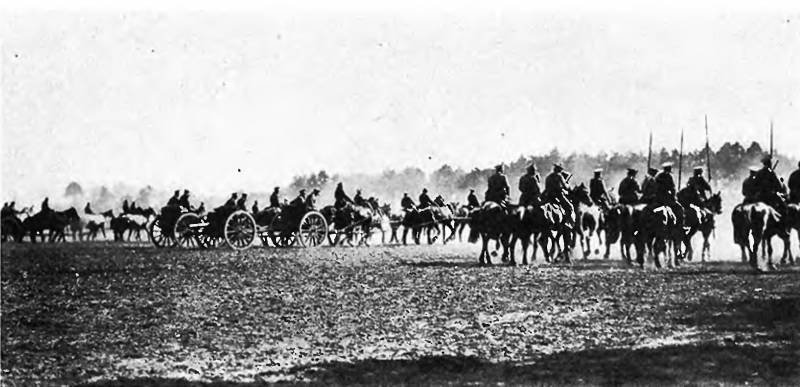Wolf trophy
At noon 22 June, after a tedious transition from Lake. White, parts of the 16 th cavalry division (17 hussars Chernigovsky, 18 th Hussars Nezhinsky, 16 th Ulansky Novoarkhangelsky and 17 th Ulansky Novomirgorodsky regiments) concentrated to the west of the village. Kostyukhnovka.
June 22 went artillery preparation on the entire front of Kostyukhnovka and south of the railway Kovel-Sarny.
On the morning of June 23, units of the 46 Army Corps launched an offensive, and the 100 Infantry Division, taking possession of the Eagle's Nest (at Kostyukhnovka), broke through the front of the enemy.
Around noon the 16-I cavalry division was moved to the breakthrough, which was a brilliant success under der. Volchetsk.
At the forefront of the division was a lancer brigade - in the direction of the village Volchetsk, Lisovo and station Volchetsk.
Parts of the 100 Infantry Division were weary and suffered heavy losses. The 397 th Infantry Regiment of Zaporozhye, having captured the first line of enemy trenches at Volchetsk, lay down at the wire barriers.
And then came the cavalry.
With a sudden dashing blow, the Russian lancers knocked down the enemy’s infantry, which had defended der. Volchetsk. Despite the loss of wire barriers 80% of the horse composition of the attacking units, a rich trophy fell into the hands of Russian cavalrymen - 14 of German guns.
Germanic batteries managed to make only a few shots, and were captured intact and safe - along with the calculations that did not manage to incapacitate even aiming devices.
An eyewitness recalled what he had seen several hours after the attack of the Nymirgorod ulan battlefield.
The bodies of dead cavalrymen and horses mostly lay along 2's ditches dug along houses, though not wide, but with steep steep walls. In this place, the attacking cavalrymen had a hitch-up - the horses were suspended, and, together with the riders, German infantrymen were firing from the fire, shooting from the windows of village houses. There was almost no loss in the open field.
The bulk of the artillery trophies were distributed as follows: during the cavalry attack directly from the village. Volchetsk in the hands of the cavalry fell Krupp 6-gun battery, and in pursuit of the enemy - 3 heavy and 4 light guns.
In total, the following trophies were captured: 17-m Lancer Novomirgorodsky regiment - 7 light guns, 16-m Lancer Novoarkhangelsky regiment - 4 howitzers, 17 hussar Chernigov regiment - 3 heavy guns.
Il 1. At der. Volchetsk. Russian cavalrymen are taking away some of their artillery trophies - the 6-gun Krupp battery.
At Volchetsk station, attacking the German battalions disembarking from the carriages, Russian cavalrymen cut down more than 100 enemy soldiers, while the rest of the infantry scattered around the surrounding neighborhoods.
The Austro-German units retreated in great disarray, and on the night of 24 June, the cavalrymen of the 16 Division seized prisoners from one of the German regiments at once in the 3-4 points of the front.
4-th Horse Corps continued to develop success.
Following the 16 Cavalry, the 1-I Trans-Baikal Cossack Division was introduced into the breakthrough, which, in conjunction with the infantry, captured from der. Wholesale 2 machine guns and 280 prisoners, as well as during the horse attack at Galusia - more 1000 captured Hungarians, 2 horse cannons and several machine guns.
24 June at the town of Gorodok the division destroyed 2 companies of enemy infantry, capturing 180 prisoners (including 3 officers), 6 machine guns and an artillery fleet of 39 boxes with a full complement of shells.
The 2-I Combined Cossack Division on that day seized warehouses on the narrow-gauge railway at places. The town, moving north.
The 16 Cavalry Division of 24 June occupied the Manevichi station, seizing large warehouses of engineering, quartermaster, artillery and sanitary equipment.
In just two days, parts of the 4 Cavalry Corps captured 1600 enemy soldiers and officers, captured 15 guns, 8 machine guns, 39 charging crates and a lot of military equipment.

Il 2. Lieutenant-General, cavalier of the Order of St. George of the 4 degree, N. G. Volodchenko - head of the 16 th cavalry division.
The head of the 16 Cavalry Division from the corps headquarters received a telegram dated 24 of June for number 8425 as follows:
“I thank you, General Konstantinov, General Kostenko (A. I. Kostenko - Commander of the 17 Uhlan Novomirgorod Regiment) - A.O.), Colonel Lermontov (G. M. Lermontov - Commander of the 16 Uhlansky Novoarkhangelsky Regiment - AO) and all he. officers of the Uhlan brigade for a dashing attack near Volchetsk, ending with the seizure of heavy and light guns.
Personally, bypassing the battlefield, I saw the valiant strikes inflicted by the lancers, for which I announce my heartfelt thanks to them. Give Chernigov hussars, who participated in the seizure of 3's heavy guns, under the command of Lieutenant Colonel Subbotin, my heartfelt thanks.
Lieutenant General Gillenschmidt ".

Il 3. Major General V.A. Konstantinov - Commander of the 2 Brigade of the 16 Cavalry Division.

Il 4. The commander of the 4 Cavalry Corps, Lieutenant General J.F. Gyllenschmidt.
Thus ended the two productive days for the Russian cavalry - during the period of use and expansion of the breakthrough at Kostyukhnovka.
But the work started was not completed, and the rate of persecution of the enemy rushed to zero. The enemy left for Stokhod, burned the bridges and entrenched himself, cutting off with barbed wire.
At the same time, the introduction of cavalry into the breakthrough was a sensible decision and brought positive operational and tactical results: the Russian cavalry helped develop the breakthrough to their infantry and dealt a powerful blow to the enemy’s communications, taking considerable trophies.

Information